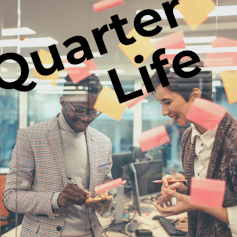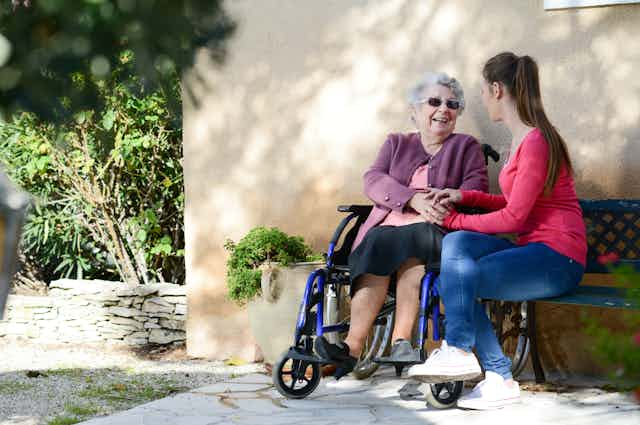We are all pretty fed up with COVID, and perhaps keen for a summer of holidays, social outings and family get togethers. But while the threat posed by COVID has certainly decreased the virus can still be dangerous, especially for older people.
Meanwhile, young people are generally at lower risk from COVID. So if you are younger and healthy, how should you balance attempts to return to normal social activities with a moral responsibility to care for people who may still be vulnerable?

This article is part of Quarter Life, a series about issues affecting those of us in our twenties and thirties. From the challenges of beginning a career and taking care of our mental health, to the excitement of starting a family, adopting a pet or just making friends as an adult. The articles in this series explore the questions and bring answers as we navigate this turbulent period of life.
You may be interested in:
I have COVID symptoms. Should I do a test?
Should I still go on holiday if I have COVID?
Five tips for young people dealing with long COVID – from a GP
Although there have been significantly fewer deaths since the introduction of COVID vaccines, it’s important to realise that vaccines are less effective at preventing infections and reinfections, particularly as time increases since the most recent dose.
This isn’t necessarily a big concern for most people, who will experience mild symptoms, especially if they’ve been vaccinated. But there are still some people, mostly older or with a range of health conditions, who remain at a higher risk of severe outcomes from COVID.
Although antiviral and other treatments for COVID are significantly better than they were a couple of years ago, it’s far safer not to need to rely on them in the first place. It’s also important to acknowledge that every COVID case carries a risk of potentially life-changing long COVID complications following the initial infection.
So while we can now rely on vaccines and medications to a certain extent, we still face significant challenges working out what a proportionate response should be as COVID infections continue to fluctuate.
Read more: Caught COVID? Here’s what you should and shouldn't do when self-isolation isn’t mandatory
A balancing act
As an example, we know that another way to reduce the impact of COVID is through public health interventions. But while some, such as the wearing of face masks, are effective and fairly benign, more intrusive restrictions must be balanced against their negative effects, especially among certain parts of the population.
Younger adults, for instance, are disproportionately affected by enforced behavioural changes including lockdowns, social distancing and working from home. An increasing number of studies now show poorer mental health and wellbeing during the pandemic among people in the 18 to 29 age group in particular.
At the other end of the spectrum we know social restrictions lead to increased loneliness among older people.

To address this balancing act, perhaps the most proportionate thing any of us can do is to simply remain aware of COVID. This could take the form of wearing a face mask in public spaces, washing our hands more often, and avoiding mixing with others if we are feeling unwell. A lesson we should all have learned from COVID is that it’s not OK to “push on” when we are ill.
Similarly, we should try to be more aware of other people. Just because you may not be concerned about catching COVID (again), this does not mean that everyone else is equally unconcerned. Realising that others have legitimate reasons to worry is important.
In relation to older and vulnerable family members, it’s worth having conversations about what they feel comfortable with. They may want to be very cautious, or they may decide that spending time with family and friends is more important to them.
If you do decide to socialise, it’s relatively cheap and easy to take a COVID test prior to visiting someone who may be at higher risk, and consider postponing a visit or activity if necessary. It should also go without saying that we should all keep our COVID vaccinations and boosters up to date.
Read more: Long social distancing: how young adults' habits have changed since COVID
The pandemic isn’t over
None of this is new or should be surprising, yet the strong desire to move on from COVID seems to mean that many are rapidly forgetting the lessons and precautions learned over the past couple of years.
Vaccines and other medical advances have been game changers, but while they mean it is unlikely that we will ever return to the draconian restrictions of 2020, we still need to take some precautions. COVID may be less lethal than it was at the outset of the pandemic, but it’s still a serious disease that demands our respect.

